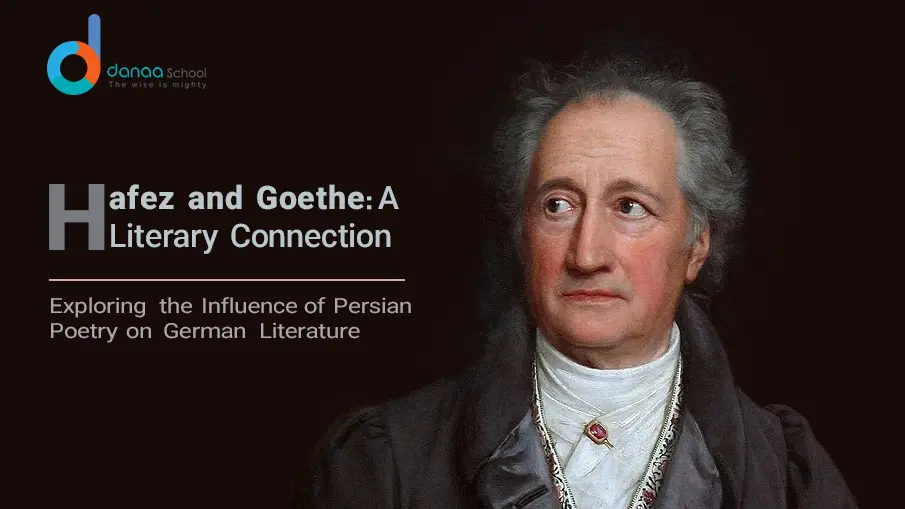In the realm of literature, some dialogues transcend time and space, resonating across cultures and epochs. One such fascinating exchange is between Hafez, the revered Persian poet, and Johann Wolfgang von Goethe, the esteemed German literary figure. Though they lived centuries apart and hailed from vastly different cultures, their poetic conversation continues to captivate and inspire readers today.
Introduction to Hafez and Goethe
Hafez, born in 14th-century Persia, is celebrated for his mystical and lyrical poetry. His work, characterized by deep spiritual insight, profound love, and a keen awareness of life’s fleeting nature, has been a cornerstone of Persian literature.
Goethe, a German poet, playwright, and philosopher from the 18th and 19th centuries, was an intellectual titan of his time. His works, which include “Faust” and “The Sorrows of Young Werther,” have left an indelible mark on Western literature.
Despite the geographical and cultural chasm between them, Hafez and Goethe found common ground in their poetic vision and philosophical reflections. Goethe’s admiration for Hafez led to a remarkable literary exchange that bridged Persian and Western traditions.
The Influence of Hafez on Goethe
Goethe’s introduction to Hafez came through the translation of Hafez’s “Divan” by Joseph von Hammer-Purgstall in the early 19th century. Captivated by the richness of Hafez’s poetry, Goethe embarked on a creative journey that culminated in his own “West-Eastern Divan” (“West-östlicher Divan”), a collection of poetry that celebrates the union of Eastern and Western thought.
Themes and Inspirations
1. Love and Divinity: Hafez’s verses often explore the mystical connection between earthly love and divine ecstasy. Goethe found this fusion of the sacred and the sensual deeply moving, reflecting it in his work.
2. Philosophical Musings: Both poets pondered the nature of existence, the passage of time, and the pursuit of truth. Goethe admired Hafez’s ability to weave philosophical depth into lyrical beauty.
3. Cultural Exchange: Goethe’s “West-Eastern Divan” serves as a testament to the enriching possibilities of cultural dialogue. Through his poetic engagement with Hafez, Goethe expressed a vision of unity and mutual respect between East and West.
Key Works and Their Significance
Hafez’s “Divan”
Hafez’s “Divan” is a collection of ghazals (lyric poems) that delve into themes of love, wine, and spirituality. The ghazals are marked by their intricate metaphors, profound insights, and a sense of divine longing. Hafez’s mastery of language and form has earned him a place among the most beloved poets in Persian literature.
Notable Poems
– “The Cupbearer”: This poem uses the metaphor of a cupbearer to explore themes of intoxication and spiritual enlightenment.
– “The Beloved’s Garden”: Here, Hafez merges the imagery of a garden with the divine presence, symbolizing the unity of love and spirituality.
Goethe’s “West-Eastern Divan”
Inspired by Hafez, Goethe’s “West-Eastern Divan” reflects a fusion of Eastern and Western sensibilities. The work is divided into twelve books, each dedicated to different aspects of this cultural dialogue. Goethe’s admiration for Hafez is evident in the way he adopts the ghazal form and themes of love, wisdom, and the eternal quest for knowledge.
Notable Sections
– “The Book of Hafiz”: Goethe pays direct homage to Hafez, celebrating his poetic genius and exploring similar themes of love and divine contemplation.
– “The Book of Timur”: This section reflects on the power and its transient nature, drawing parallels between historical events and universal truths.
The Legacy of Their Dialogue
The interaction between Hafez and Goethe exemplifies how literature can transcend cultural and temporal boundaries. Their works continue to inspire readers and writers worldwide, fostering a deeper appreciation for the richness of cross-cultural literary exchanges.
Modern Interpretations
Today, scholars and enthusiasts continue to explore the resonance between Hafez and Goethe. Their dialogue offers valuable insights into the shared human experience, emphasizing themes of love, wisdom, and the eternal quest for understanding.
– Cultural Festivals: Events celebrating the works of Hafez and Goethe highlight the enduring appeal of their poetic conversation, bringing together audiences from diverse backgrounds.
– Literary Studies: Academic research delves into the intertextual connections between the poets, examining how their works reflect and enrich each other.
FAQs
**1. Who were Hafez and Goethe?**
Hafez was a 14th-century Persian poet known for his lyrical and mystical poetry, deeply embedded in Sufi themes. Johann Wolfgang von Goethe was an 18th-century German poet, playwright, and philosopher, renowned for his profound impact on Western literature through works like “Faust.”
**2. How did Goethe come to know about Hafez’s work?**
Goethe was introduced to Hafez’s poetry through the German translation of Hafez’s “Divan” by Joseph von Hammer-Purgstall. This translation deeply influenced Goethe and inspired him to write his “West-Eastern Divan,” a collection that echoes the themes of East and West unification.
**3. What is the “West-Eastern Divan”?**
The “West-Eastern Divan” is a collection of poems by Goethe that pays homage to Eastern thought, particularly Persian literature, through the influence of Hafez. The collection explores themes of love, philosophy, and the bridging of cultural divides.
**4. What are some themes common to both Hafez and Goethe’s works?**
Both poets delved into themes of love, divinity, and philosophical musings. They explored the intertwining of earthly love with spiritual enlightenment, the transient nature of life, and the pursuit of truth through their poetic expressions.
**5. Why is the dialogue between Hafez and Goethe significant today?**
Their cross-cultural literary dialogue showcases the power of literature to transcend temporal and geographical boundaries, fostering mutual respect and understanding between diverse cultures. This ongoing dialogue continues to inspire scholars, poets, and readers, emphasizing the universality of human experiences and values.
Conclusion
The poetic dialogue between Hafez and Goethe remains a shining example of how literature can bridge cultural divides and resonate across centuries. Their shared themes of love, wisdom, and the search for truth remind us of our common humanity and the timeless power of poetry.
For more enlightening discussions and a deeper understanding of literary connections, join us at Danaa School. Our comprehensive curriculum and diverse programs encourage students to explore the profound dialogues that shape our world. Enroll today to embark on a journey of cultural discovery and intellectual growth.










